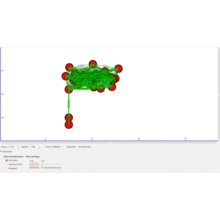Wireless Research Based Projects
Wireless Research-Based Projects on NS3 tool that we carried out are shared in this page, you can get our services by contacting us. Drop us a mail to get best project results. Network Simulator 3 (NS3) is a free, open-source, discrete-event network simulation tool. We recommend few NS3 project plans which are research-focused as well as highly significant to modern tendencies in network technology:
- 5G Network Performance Analysis:
- Concentrating on network intensity, throughput, and latency, we plan to explore the challenges and abilities of 5G networks. The influence of progressing mechanisms such as network slicing and Massive MIMO ought to be examined in an extensive manner.
- IoT Network Scalability and Security:
- The adaptability of extensive IoT networks has to be investigated. It is advisable to evaluate security protocols. The process of simulating an enormous number of interrelated IoT devices and assessing different security criterions could be encompassed in this study.
- Vehicular Ad-hoc Networks (VANETs) for Intelligent Transportation:
- Generally, in VANETs, our team plans to simulate and explore the communication protocols. The applications in vehicle-to-infrastructure interactions, traffic management, and protection should be considered.
- Optimization of QoS in Multimedia Transmission over Wireless Networks:
- For applications such as VoIP or video streaming, we intend to assess the Quality of Service (QoS) in wireless networks. Under differing load densities of the network, it is advisable to consider jitter, bandwidth allocation, and latency.
- Machine Learning for Network Traffic Prediction and Management:
- In order to enhance network traffic management, our team aims to utilize machine learning methods within NS3. Typically, predictive traffic exploration, load balancing, and congestion management could be the main consideration of this study.
- SDN and NFV in Network Architecture:
- Within network architectures, we focus on investigating the deployment of Network Function Virtualization (NFV) and Software-Defined Networking (SDN). The influence on network adaptability, management, and effectiveness must be examined.
- Underwater Wireless Communication Networks:
- Concentrating on specific limitations like inadequate bandwidth, signal attenuation, and multipath propagation, our team plans to design and explore underwater wireless networks.
- Performance Analysis of IPv6 Deployments:
- In different network settings, it is advisable to simulate the implementation of IPv6. In comparison with IPv4, we focus on investigating its limitations, effectiveness, and adaptability.
- Energy Efficiency in Wireless Sensor Networks (WSNs):
- In sensor networks, examine and improve the utilization of energy through constructing suitable simulations. For extensive ecological tracking and smart city applications, these simulations are considered as most significant.
- Cybersecurity Mechanisms in Advanced Network Architectures:
- Specifically, advanced network assaults ought to be simulated. In modern network infrastructures, our team aims to assess the performance of different cybersecurity protocols and intrusion detection systems.
- Satellite Network Communication and Protocol Evaluation:
- Through the utilization of NS3, we plan to explore satellite communication networks. The crucial factors such as inter-satellite link communications, orbital dynamics, and signal propagation have to be considered.
- Cloud Computing Network Performance:
- Mainly, concentrating on service-oriented infrastructures, data center networking, and cloud storage, it is significant to examine the effectiveness of cloud computing networks.
- Cross-Layer Design Strategies in Wireless Networks:
- As a means to improve entire network effectiveness, the possible limitations and advantages of cross-layer design techniques should be analyzed in wireless network protocols.
- Integration of Renewable Energy Sources in Telecommunication Networks:
- Typically, the practicability and network influence of integrating renewable energy sources like wind or solar power into telecommunication network architectures must be investigated in an extensive manner.
create research title
The research title should be brief, explicit and must outline the main objective of the research. We offer a simple instance based on how to create a research title on the basis of a theoretical research in environmental science:
Research Focus:
- Impact of Urbanization on Local Bird Populations
Significant Research Query:
- In what manner does the variety and broad range of regional bird species are impacted by the extension of urban regions?
Constructing the Title:
- It is advisable to begin with the major topic, “Urbanization’s Impact”
- The concept of research has to be indicated, “on Local Bird Populations”
- Focus on mentioning the novel aspect or objective of our study, “A Comparative Study of Diversity and Abundance”
Final Research Title:
- “Urbanization’s Impact on Local Bird Populations: A Comparative Study of Diversity and Abundance”
We have provided numerous NS3 project plans which are research-focused as well as appropriate to recent tendencies in network technology. Also, an instance on the basis of how to develop a research title according to a conceptual research in environmental science are suggested by us in this article.
Ns3 Research Based Projects
Ns3 Research Based Projects that you can consider are listed here. Our team consists of highly skilled Ns3 professionals who possess extensive knowledge and experience in a variety of fields. We understand that every researcher has distinct needs, and we customize our services to meet those individual requirements.
- Resource Allocation for Vehicular Fog Computing Using Reinforcement Learning Combined With Heuristic Information
- A Many-to-One Matching based Task Offloading (MATO) Scheme for Fog computing-enabled IoT Systems
- A Lightweight Autoscaling Mechanism for Fog Computing in Industrial Applications
- Task Offloading for Edge-Fog-Cloud Interplay in the Healthcare Internet of Things (IoT)
- FRATO: Fog Resource Based Adaptive Task Offloading for Delay-Minimizing IoT Service Provisioning
- Delay-Aware Secure Computation Offloading Mechanism in a Fog-Cloud Framework
- TelcoFog: A Unified Flexible Fog and Cloud Computing Architecture for 5G Networks
- Blockchain-Based Decentralized Reverse Bidding in Fog Computing
- A Fog based system model for cooperative IoT node pairing using matching theory
- Fog computing in multi-tier data center networks: A hierarchical game approach
- Fog assisted Visitor Identification Framework with improved Latency and Network Usage
- How much can Fog Computing enhance performances of heterogeneous delay-sensitive services in Smart Cities?
- A Fog Computing Framework for Quality of Service Optimisation in the Internet of Things (IoT) Ecosystem
- A Collaborative Computation and Offloading for Compute-intensive and Latency-sensitive Dependency-aware Tasks in Dew-enabled Vehicular Fog Computing: A Federated Deep Q-Learning Approach
- Distributed Fog Computing and Federated-Learning-Enabled Secure Aggregation for IoT Devices
- Context-Aware Data-Driven Intelligent Framework for Fog Infrastructures in Internet of Vehicles
- Energy-Aware Marine Predators Algorithm for Task Scheduling in IoT-Based Fog Computing Applications
- PCP: A Privacy-Preserving Content-Based Publish–Subscribe Scheme With Differential Privacy in Fog Computing
- Privacy-Aware Efficient Fine-Grained Data Access Control in Internet of Medical Things Based Fog Computing
- Fog computing: Data analytics and cloud distributed processing on the network edges

 Click Here to watch our latest output video using NS3 simulator
Click Here to watch our latest output video using NS3 simulator  Click Here to watch our latest projects screenshots using NS3 simulator
Click Here to watch our latest projects screenshots using NS3 simulator